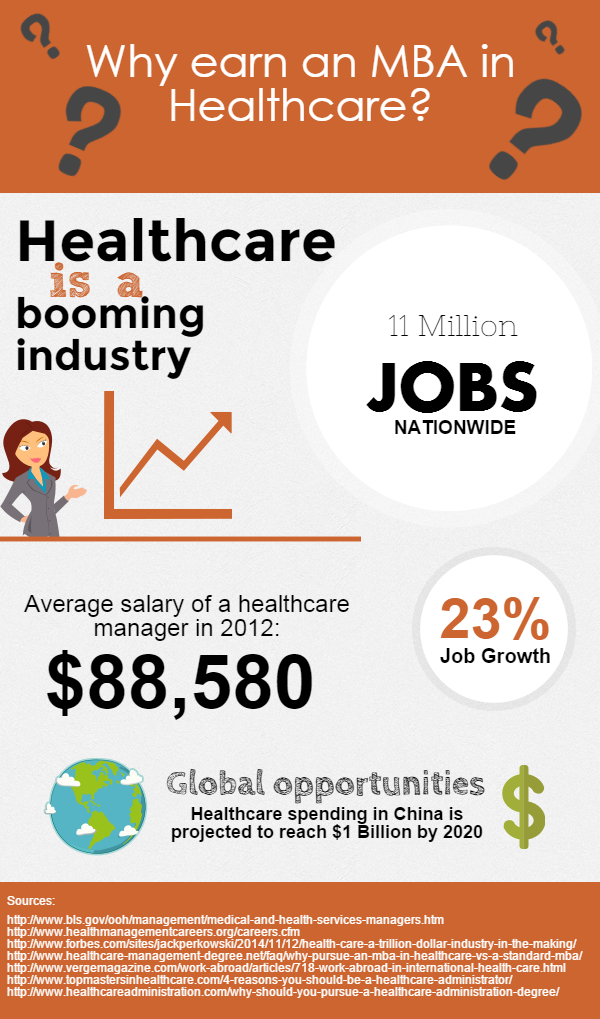
In healthcare, there are two types of professionals: those who provide clinical care, such as physicians, nurses and lab technicians, and those who work on the business aspects of healthcare, such as chief executive officers, operations managers and finance directors. If your interest falls in the latter category, an online MBA with a Concentration in Healthcare Management can give you the specialized skills you need to succeed. Here are five reasons to earn an MBA in healthcare:
- An abundance of career opportunities in a booming industry
Healthcare is one of the largest industries in the United States, accounting for approximately 11 million jobs nationwide. Rapid job growth is expected to continue over the next few years, as the aging baby boomer generation fuels demand for healthcare services and the implementation of healthcare reform has a cascading effect on several healthcare occupations, such as primary care, regulatory law, community health and pharmacy. Healthcare employment at the management and executive level is expected to grow much faster than average from now until at least 2022, according to the Bureau of Labor Statistics.
If you already work in healthcare, earning an MBA is one way to progress toward a leadership role. Coursework in an MBA in healthcare program will teach business fundamentals through classes in accounting, finance management, organization management, human resources management and economics. In addition, you will learn about the U.S. healthcare system, marketing, ethics and other topics in healthcare.
An MBA in healthcare can give you the training and credentials you need to work in a range of healthcare settings, including hospitals, doctors’ offices, nursing homes, device manufacturers, pharmaceutical companies, insurance companies, government agencies or consulting firms.
- Higher earning potential
In addition to the growth and variety of healthcare jobs, those interested in the field can enjoy above-average salaries. According to the Bureau of Labor Statistics, healthcare managers earned a median salary of $88,580 per year in 2012 – well above the national average for all salaries. At the higher end of the range, you could earn up to $200,000 annually. Individuals with the highest earning potential are those who manage large groups of healthcare practitioners and those who work in larger hospitals or companies.
- International opportunities
The U.S. healthcare market isn’t the only one to see exponential growth. International markets are also seeing rapid expansion, opening up job possibilities abroad. For example, in China, healthcare spending is projected to reach $1 trillion by 2020, according to consulting firm McKinsey and Company – up from $350 billion today. Other areas of the world need healthcare workers, too. The World Health Organization (WHO) reports that sub-Saharan Africa shoulders one-quarter of the global burden of disease, but only 3 percent of the global health workforce.
International healthcare positions are very competitive, and a healthcare MBA can give you an advantage with employers and teach you practical skills, such as leadership and management, that are critical for success. Working internationally can also expose you to new cultures, people and experiences, and may open doors to new career opportunities when you return to the U.S.
- Transferrable skills
If you are considering an MBA in healthcare, you may already have a background in the field. But suppose you want to work in a different industry later in your career. A healthcare MBA allows you to do that. Because much of the curriculum in a healthcare MBA program focuses on business fundamentals, this degree can offer you the flexibility to work in finance, marketing, human resources or another industry down the line.
- Ability to make a difference
Unlike many jobs in business, or any other industry, healthcare executives have the opportunity to make a long-lasting impact on individuals and society. As a healthcare administrator, the decisions you make could affect hundreds or thousands of people who are relying on high-quality, dependable healthcare. You won’t just be responsible for buildings, policies and equipment – you will have the potential to positively impact lives on a daily basis.
Sources:
http://www.bls.gov/ooh/management/medical-and-health-services-managers.htm
http://www.healthmanagementcareers.org/careers.cfm
http://www.healthcare-management-degree.net/faq/why-pursue-an-mba-in-healthcare-vs-a-standard-mba/
http://www.vergemagazine.com/work-abroad/articles/718-work-abroad-in-international-health-care.html
http://www.topmastersinhealthcare.com/4-reasons-you-should-be-a-healthcare-administrator/
http://www.healthcareadministration.com/why-should-you-pursue-a-healthcare-administration-degree/